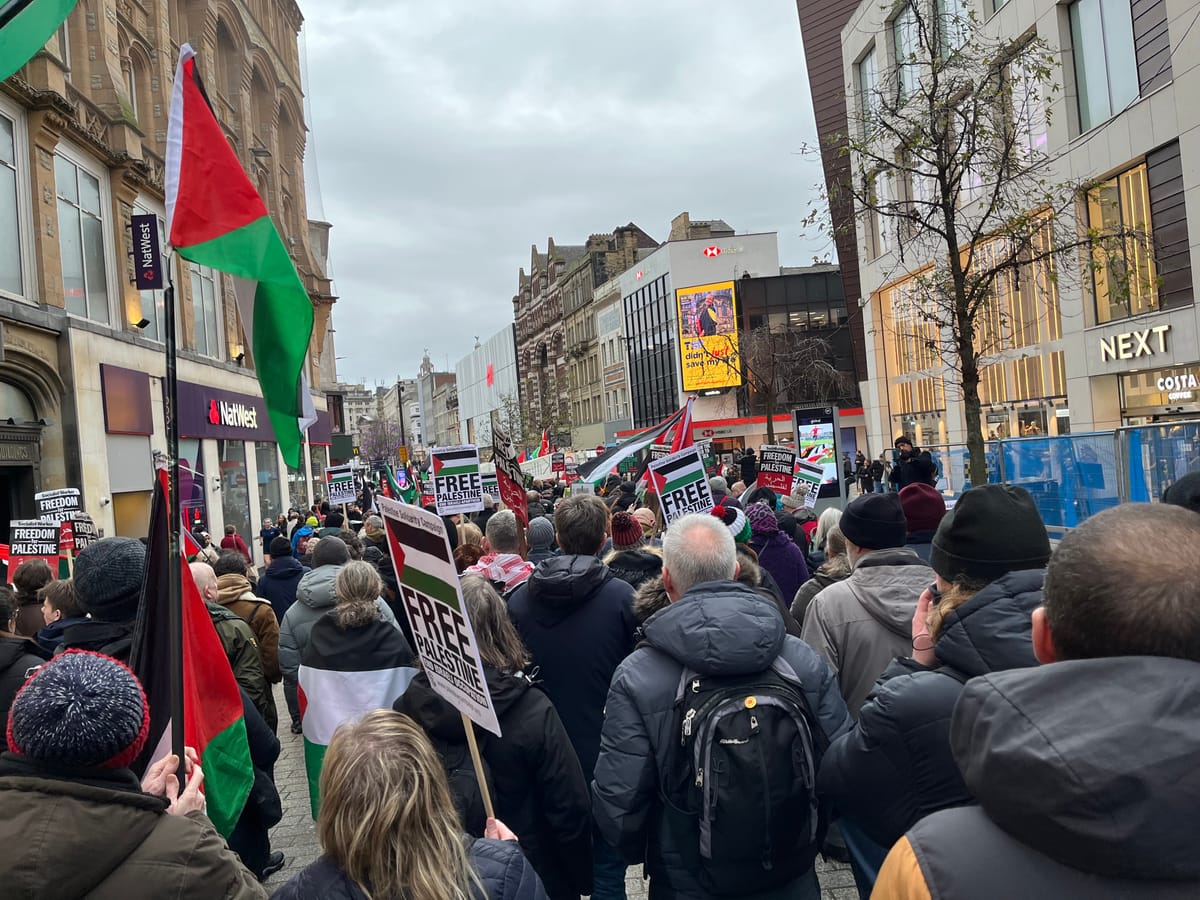Going Green, the view from the beginning of 2024

I haven't posted here for quite a while, a dear one is being treated for a serious illness and my mind has been on other things. I also lost my job, which was quite careless I suppose, and then found another one. So my mind has been taken up with a lot of learning new things and whatnot. Then I also just took several weeks off just to decompress before I started looking.
I had great plans to do lots of writing over the last few months but in fact I've been mostly reading pot boiler Sci Fi and listening to podcasts like Deprogram, Millennials are Killing Capitalism, Guerrilla History (amongst many others) and that was enough for my brain to take in.
I create music and I've had the same problem finding the energy to do much there, there's a couple of tunes I'd like to finish but I haven't been able to. I did do a low effort thing a few days ago, though.
The mass murder in Palestine has been squatting like a desperate dog in my mind for weeks. I find it really difficult to engage politically because of it. I find my self wanting to scream at people defending the Israeli government. Defending the indefensible is a poor place to be, and that's the most anodyne thing I could say. What I really want to scream at them is probably not something I should put here.
It feels hard to create, to make anything worthwhile, when thousands are being murdered for the crime of being in the way of attempts to steal their land. The war is not nuanced or difficult to understand, its dispossession and murder dressed up as religious differences. Listening to anti-muslim bigots using their ignorance of that religion's teachings to justify the murder is also exhausting. Calling it a death cult is disgusting and wrong. It's also projection, the zionists are being quite open in their desire to kill Palestinians, it's not hard to find this. The zionists are also quite happy to kill Israeli citizens to stop them being taken hostage, so one wonders whether the death cult label is projection. The darker parts of the muslim religion that come to the fore in discussion are a function, at least in part, of the material conditions people find themselves struggling with, not a cause of them.
One thing I have done, though, is join the Green Party. I was having a discussion with a friend at the World Transformed conference back in October. He pointed out to me that the party has over 50,000 members, several councillors and one MP. Why waste your time with initiatives like Transform when there is an eco socialist party with a huge membership that's growing. I've been working with the local party delivering leaflets and have met Jo Bird, the Green parliamentary candidate where I live, who is a decent hard working green socialist who wants a better world. I think she has a real chance at the next election.
I'd encourage others who want change and don't want to waste their time with trying to build something from scratch to join the Green Party too.
The Party isn't perfect, and I think there's potentially a bit of a North/South divide, but it's way ahead of trying to found yet another new socialist party in the current climate. Local parties also have a lot of autonomy. You won't get the imposition of candidates you get with Labour, for example.
Waste
In one of the podcasts I heard an interview with Ali Kadri who was talking about how the overpowering demand for profit is built on waste. In particular the waste of human potential. That cheap clothing you wear is cheap because another human being's life was shortened, those commodities you didn't pay much for are because someone else's life chances were restricted. The waste of human potential is beyond criminal, but it keeps the profits flowing.
I've said elsewhere in my writing that there is a strange problem with capitalist logic against human logic. If something can be bent, broken or distorted enough to make enough profit it will be, if it can't then it won't happen. If making a profit will cost people their lives then they will die. This is why pointing to the stupidity and evil of this waste doesn't help. Undoing the damage means undoing the profit-based system. It's one of the reasons that people call for system change. It's also one of the ways good seeming policies, like the green new deal, end up being transformed into something worthless that makes money for the venal. The stupidity is built in to the assumptions behind any "new" initiative.
For change to happen the conditions need to be right. Again, you find that folks often try to wish a better world into existence. It will come, but not without a fight of some form or another. We learn how to make a better world by struggling with the one we have. We learn how to overcome the mindless drive for profit at the expense of human life by battling to overcome it. You cannot snap your fingers, there is no deus ex machina waiting to pluck us out of an impossible situation. We have to find our own way and it's going to be hard work.
Rent seeking
We've been sold this fantasy where the drive for profit is the only way to do anything. The services created under the old social contract have all been privatised and turned into expensive crap that ticks a box but doesn't meet people's needs. In the times we live in now, human needs come last instead of first. For example even as recently as ten years ago, if you wanted a luggage trolley at the airport it was probably free. Now, they need you to put money in a machine. Everywhere you look someone is trying to get you to pay them rent, just to use services or do things that used to be free or just part of making people's lives better. Think car parking, even if you aren't a fan of the car, suddenly there's a queue of people policing car parks and demanding large sums of money if you break some silly rule. You never used to pay to park at hospitals. Another example, banks didn't used to charge all the silly fees they find to put your account over the limit and now it's a major source of revenue.
Seeking rent, receiving dividends or interest instead of working for a living, is where the rich are at. If you read one of the books like Kiyosaki's Rich Dad, Poor Dad the first thing you will see is a comment like rich people buy assets that make money, poor people spend their money straight away. So instead of buying a car you invest in something that buys the car. Putting aside the obvious nonsense that someone who can only just get by attempting to be able to buy any kind of asset that could pay for a car it's obvious that there is a different mind set involved here. If I recall correctly Kiyosaki lived free in his parents' basement while he learned to flip properties, parasitising on the suffering of people whose houses had been repossessed. As usual the success is built on privilege.
Profit comes from the difference between the rent paid for someone's time and the value their labour adds to the service or product they make. Interest and rent come when the profit is divided up to pay off loans and the like. The rentier gets paid for owning, not doing. They get paid for privilege - this is one of the things that isn't obvious about the world we live in in the global north. On the surface everything is fair, underneath there's an owner making sure you stay poor, and stay in your lane. It's unquestioned, unending privilege, playing you with a comfortable pantomime, that keeps you hungry. You only have to look at how disconnected Tory and Labour politicians are from the every day lives of the rest of us to see this.
In the global south the naked expropriation and its human cost is far more obvious.
Contradictions
There are five main contradictions that drive capitalist society. In brief:
- Worker and capitalist - low wages, high profits, using up human beings to keep the motor running.
- Capitalist and capitalist - even if they wanted to be nice surviving the first contradiction makes it impossible. The nastiest will always win and the better human beings are forced to go along with it or disappear. Competition makes human-centric behaviour across the whole system impossible.
- Emerging monopoly - markets have winners and losers. The winners become monopolists. The monopolists change the rules to make competing with them almost impossible. The recent calls for the AI industry to be regulated and therefore lock out the smaller players is an example of this. This is why the concept of crony capitalism is such bunk, you always end up with monopoly in the end.
- Over investment. Only so much stuff can be made, eventually there will be nothing left to invest in as capital in general increases. The trillions of dollars won't be able to go anywhere and the system will come to a halt.
- The declining rate of profit. This is discussed more below.
If profit and growth comes from the difference between the rental of workers’ time and the value that time adds to the things they work on investing in better technology means workers can make more with less.
Over time, the ratio of money invested to what can be extracted from workers will fall, because the amount spent on plant and technology will increase because of competition, while the value the worker adds gets spread ever more thinly over the cost of technology. This means the ratio amount of profit will fall even if the number of commodities increases. Think about it, the more technology you have in the mix, the less the worker needs to to do create commodities, but as the worker is the source of profit, proportionally the less profit can be made.
So you have the never ending pressure to suppress wages and lengthen the time people work. The laws originally introduced in the 19th century to limit the working day weren't to help the worker, they were there to stop the worker being used up too quickly to be replaced. Capitalist society in general had to take steps to stop humans being used up in the particular. Marx covers this in the first volume of Capital. It also means that often investment in more effective technology isn't made when there is little competition, why invest when you can just turn the screws more or get cheaper labour abroad to do the work? This is why you often see moribund industries disappear in some countries to be replaced by workers overseas. The new plant overseas has better technology, it can make things more cheaply, and the original plant wasn't invested in because its owners were happy to pocket the profits because it beats working for a living. Of course, the workers in the global south lack rights, which allows super profits compared with those in the north.
It also gives the lie to the nonsense about innovation. Everyone is sacrificed on the altar of profit. Innovation only happens if it’s forced by wars or inter capitalist competition. Once the monopolies arise it's far more about innovative ways to rip people off.
We have a drive to impoverish everyone so to make more profit from their labour. Then we have the final contradiction - how do impoverished people buy the goods they make?
Markets
We've been conned by our owners and the neoliberal economists in their pockets that markets are the best way to do everything. The great Thatcherite call was always for less state intervention, introducing private enterprise, and using markets to get the best service for the least money. This was nothing but a smoke screen for dismantling the services we all relied on and replacing them with profit making enterprises that deliver worse outcomes for the people that need them. Profit first, people a long way behind. This happened everywhere in the world after the late 1970s. For example, in the Arab world, post-colonial regimes that had protected their local economies and built up the living standards of their local working class were broken up sold to the highest bidder. After this transitional period virtually everywhere in the global south is under the neocolonial boot, with the living standards of the people who live there ruined so the owners in the global north can make money - it's the same failed (for ordinary people) model everywhere. The echoes of the destruction of the Soviet Union are still being felt all across the world - for all its faults its very existence kept the rapacious empire in check.
Markets also suffer from flaws that can't be overcome. For them to work they have to have rules. Whoever determines the rules can make sure that the original state owned enterprises, or health systems, power companies, etc. will do worse than privately owned ones, at least long enough to ruin them. If the rule makers are in the pockets of the owners then we will be robbed blind while being told it's the best of all possible worlds. For example, the NHS cannot reclaim VAT, which makes external companies much cheaper on paper and has resulted in a lot of second rate services purporting to support the work of the NHS springing up because they appear to be cheaper when the true cost is hidden. The shenanigans over VAT was done deliberately to make privatisation easier. Another example, there was a world wide rise in the cost of energy some years ago that was blamed on the rising Chinese economy, in fact the people running commodities markets started to allow speculators to do destructive things that once again channelled money to the owners from the owned. Banks encouraged wealthy individuals to invest in energy markets in ways that drove the prices right up, resulting in starvation in poor countries and businesses going to the wall in the richer ones.
Another thing markets can't do is serve the needs of relatively small numbers of people where competition makes no sense. For example in areas of Scotland with low population densities public transport has to be subsidised, there simply aren't enough people to make a profit and keep services running. We see this even in more populous areas, where late night buses and trains are subsidised because otherwise they wouldn't run. After the murderous 1973 coup in Chile the neoliberals were given a population cowed by mass murder to do the earliest experiments in neoliberalism's obsession with selling things off and marketising everything. To the surprise of no-one with a working brain, the Chilean economy did not improve, it collapsed and they had to undo some of the reforms just to keep the lights on. This dishonest thievery has never worked for the majority, but you try finding a mainstream economist willing to admit it.
The obsession with markets looks like idiocy, but it makes a lot of sense if you want a smoke screen to redesign systems so the wealthy can rob the rest of us blind. Thatcher and Regan's rhetoric was all about freedom and unleashing resources to make things better for everybody, the now infamous trickle down theory, which turned out not to be wealth trickling to the rest of us but something far less savoury. They did not de-regulate so much as re-regulate to make it easy for the amoral and unscrupulous to rob the rest of us.
Imperialism
When we talk about Thatcher's incoherent burbling about freedom it's instructive to remember her giving speeches to the Muhadjeen in Afghanistan, the only freedom she was really interested in was the one to make money from other people's suffering. The freedom not to suffer doesn't figure. They were fighting an enemy she needed to destroy and that was good enough, whatever the ultimate consequences for the Afghani people.
Marxists use the word imperialism to categorise late-stage capitalism like we live under now. Due to contradictions like impoverishing the people you need to buy your products, the rate of profit begins to fall, and has been falling for a long time. If you take this to its logical conclusion one day there will be no profit. There's also the impossible problem of infinite growth. Once it grows it will be reinvested. Eventually there will be a glut of capital, because all of the things that can be profitably invested in have been. Again, this will cause a crash, because the trillions of dollars that can't be invested will stop the circulation that keeps capitalist economies running.
So we have a moribund capitalism that's desperate to keep itself alive. What can it do? It can violently capture markets and destroy the direct productive capacity there so things will have to be imported and it can sell its goods. This happened in India when it was colonised by the British, the Indian cloth industry was destroyed to create demand back in England. It can drive the costs of raw materials down by holding a gun to the heads of a comprador class in resource rich countries. The members of that class end up rich, after negotiating the surrender of the resources, the rest of the population lose out massively. It can attack the working class everywhere and smash resistance. It can go to war and burn up some of the excess capital by literally blowing it up.
Once all the markets are sewn up you end up in a situation where the capitalists need to compete with each other for these markets and resources. Then we have militarism and investment in wars, accompanied by a lot of lying about the real motivation for those wars.
We also see this desperation in the global north. Everywhere you look there is now someone trying to make a few pence out of everything you see or do. We have to pay for services that used to be free, the rhetoric about markets makes it OK to starve and damage vulnerable people. And still the rate of profit is falling, still capital is desperately looking for somewhere to be invested. Hyper profits can be made by stealing oil, and the minerals needed by the information age, but only for so long. The contradictions inherent in the system are insurmountable using the methods that create them in the first place. Profit and infinite growth will not save us, quite the opposite. The rentiers want to make money from rent, because it beats working for a living, and they're trying to financialise everything so there's a profit for them everywhere. Eventually capital chokes on itself.
Neocolonial imperial rents
Take a post-war independent country run by a social-democratic post-colonial government that is protecting its local markets to grow them and demanding a fair price for the resources under its soil. The money raised from this is used to reinvest, educate, house, and keep the local population healthy. The ordinary people living in those countries see strong growth in their standard of living.
The owners of the countries in the global north don't want this. They want the resources and the labour as cheap as possible, and they want any purchasing power left to be used to buy their products not locally produced ones. So the social-democratic leaders are assassinated or driven out by well-funded coups, the leaders of those coups sell off everything and become fabulously wealthy. They are encouraged to borrow money, money the previous leaders didn't think was needed, and when the loan can't be repaid because it was spent on toys for rich people and not invested, then more is borrowed to pay the interest on the first loan.
Part of the conditions for the loans destroying these countries is to undo all of the work done by the state-socialists and take the neoliberal model at face value, so everything is sold to foreign investors at a massive discount and the gains the worker class made undone. It's the same model that happened in the global north, just the people there started off much poorer. The worker class in the global north was originally bought off with some of the flow of resources from the global south, but the crisis has made that happen less and less, as fewer crumbs fall from the rich person's table. We still have a group of people in the global north that believe in the old social democracy, that was funded in this way, but in fact our interests lie with the workers of the global south. Taking an I'm alright Jack attitude to the suffering in the global south won't save us anyway. The crisis undermining the capitalist empire is coming whatever wishful thinking it tries to sell us. How we respond to it will determine whether or not we survive, and also whether we deserve to.
We are told that places like Africa and Latin America are irredeemable because of the corruption, but the first part of the tale where what became the corruption was part of a well oiled trap to wreck the place and force it into an inescapable debt peonage is omitted. The evil dictators we are supposed to dislike are mostly compradors, who will never be called before places like the international court of human rights but quietly supported if they need to keep their local populations quiet. The way the Arab spring movement just died out illustrates this point very clearly. The oppressive regimes destroyed the organisations that could have led to real change and left the people leaderless.
Of course, if you can dominate another country and force it to pay you interest on unpayable loans, you can make its slavery pay. The countries that managed to escape the chains of colonial possession and started down a state-socialist path in the 1950s and 60s were slowly brought to heel with assassinations and economic bludgeons like the loans discussed earlier. As stated before, the illegal dissolution of the Soviet Union made this much easier because there was no longer an example people could point to. The old direct colonialism was replaced with a more subtle neocolonial one that nominally allows less powerful countries their sovereignty to do as they wish, but in fact those that didn't want to follow what became the neoliberal orthodoxy found their leaders assassinated and economies destroyed with sanctions. Sanctions are just war that kills more slowly than bombs. To understand this, remember that sanctions killed half a million Iraqi children, even before the invasion.
Under Bush and later Obama the US founded Africom, which is a command and control organisation that allows it to wage war on the African continent. It trains and aids the comprador military in the African continent in order to keep the resources firmly under US control. You will rarely hear it mentioned, but it is a neocolonial bulwark helping to keep African peoples exploited and poor. Anti-imperialist campaigners in the US regularly draw attention to its existence and what it does. Libya was an anomaly in this scenario. The destruction of the wealthiest country in Africa was a great victory for them.
Another example is the way the French state still dominates its former colonies with the CFA Franc that robs them of their autonomy and quite a lot of cash. The recent disputes in Niger were at least in part the rebel government trying to get out from under the French colonial boot and take control of their own economy, despite nominally gaining independence in 1960.
Modern capitalism needs neocolonialism, which is an aspect of modern imperialism without the overt use of force. The military side is still there, just not supporting direct colonisation, instead assisting disgusting regimes and stirring up trouble to keep rebellious populations distracted and under control. In Niger we have seen that the military side will come out if people manage to escape the colonial boot, or fight back. What's happening in Palestine is happening everywhere, just not as blatantly malignant.
We are all Palestinians.
The swan is on life support
If you remember the old saying about a swan looking calm and beautiful as it glides across the water but underneath it is paddling furiously to keep itself where it wants to be, then moribund late capitalism is a dead, cyber swan with tarnished feathers falling out. Its laser eyes are dimming and the beak decayed to a manic grin. It's padding so furiously against the overwhelming current of its own contradictions it's almost aquaplaning. We are expected to subscribe to the notion that all is well, when we know there is an ecocide coming and the wheels are coming off the privilege based system that's killing us.
Capitalism cannot bring justice, capitalism is the quintessence of injustice. We must free ourselves of our addiction to it before it kills us.




